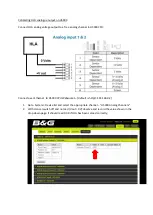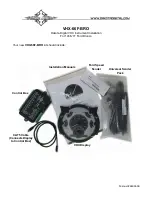
13 ENGLISH
6.
Do not open or mutilate the battery(ies).
Released electrolyte is corrosive and may
cause damage to the eyes or skin. It may be
toxic if swallowed.
7.
Do not charge battery in rain, or in wet locations.
SAVE THESE INSTRUCTIONS.
WARNING:
DO NOT let comfort or familiarity
with product (gained from repeated use) replace
strict adherence to safety rules for the subject
product. MISUSE or failure to follow the safety
rules stated in this instruction manual may cause
serious personal injury.
Important safety instructions for
battery cartridge
1.
Before using battery cartridge, read all instruc-
tions and cautionary markings on (1) battery
charger, (2) battery, and (3) product using battery.
2.
Do not disassemble or tamper with the battery
cartridge.
It may result in a fire, excessive heat,
or explosion.
3.
If operating time has become excessively
shorter, stop operating immediately. It may
result in a risk of overheating, possible burns
and even an explosion.
4.
If electrolyte gets into your eyes, rinse them out
with clear water and seek medical attention right
away. It may result in loss of your eyesight.
5.
Do not short the battery cartridge:
(1)
Do not touch the terminals with any con-
ductive material.
(2)
Avoid storing battery cartridge in a con-
tainer with other metal objects such as
nails, coins, etc.
(3)
Do not expose battery cartridge to water
or rain.
A battery short can cause a large current
flow, overheating, possible burns and even a
breakdown.
6.
Do not store and use the tool and battery car-
tridge in locations where the temperature may
reach or exceed 50 °C (122 °F).
7.
Do not incinerate the battery cartridge even if
it is severely damaged or is completely worn
out. The battery cartridge can explode in a fire.
8.
Do not nail, cut, crush, throw, drop the battery
cartridge, or hit against a hard object to the
battery cartridge.
Such conduct may result in a
fire, excessive heat, or explosion.
9.
Do not use a damaged battery.
10.
The contained lithium-ion batteries are subject to
the Dangerous Goods Legislation requirements.
For commercial transports e.g. by third parties,
forwarding agents, special requirement on pack-
aging and labeling must be observed.
For preparation of the item being shipped, consult-
ing an expert for hazardous material is required.
Please also observe possibly more detailed
national regulations.
Tape or mask off open contacts and pack up the
battery in such a manner that it cannot move
around in the packaging.
11.
When disposing the battery cartridge, remove
it from the tool and dispose of it in a safe
place. Follow your local regulations relating to
disposal of battery.
12.
Use the batteries only with the products
specified by Makita.
Installing the batteries to
non-compliant products may result in a fire, exces
-
sive heat, explosion, or leak of electrolyte.
13.
If the tool is not used for a long period of time,
the battery must be removed from the tool.
14.
During and after use, the battery cartridge may
take on heat which can cause burns or low
temperature burns. Pay attention to the han-
dling of hot battery cartridges.
15.
Do not touch the terminal of the tool imme-
diately after use as it may get hot enough to
cause burns.
16.
Do not allow chips, dust, or soil stuck into the
terminals, holes, and grooves of the battery
cartridge.
It may result in poor performance or
breakdown of the tool or battery cartridge.
17.
Unless the tool supports the use near
high-voltage electrical power lines, do not use
the battery cartridge near high-voltage electri-
cal power lines.
It may result in a malfunction or
breakdown of the tool or battery cartridge.
18.
Keep the battery away from children.
SAVE THESE INSTRUCTIONS.
CAUTION:
Only use genuine Makita batteries.
Use of non-genuine Makita batteries, or batteries that
have been altered, may result in the battery bursting
causing fires, personal injury and damage. It will
also void the Makita warranty for the Makita tool and
charger.
Tips for maintaining maximum
battery life
1.
Charge the battery cartridge before completely
discharged. Always stop tool operation and
charge the battery cartridge when you notice
less tool power.
2.
Never recharge a fully charged battery car-
tridge. Overcharging shortens the battery
service life.
3.
Charge the battery cartridge with room tem-
perature at 10 °C - 40 °C (50 °F - 104 °F). Let
a hot battery cartridge cool down before
charging it.
4.
When not using the battery cartridge, remove
it from the tool or the charger.
5.
Charge the battery cartridge if you do not use
it for a long period (more than six months).
Содержание UM110DWYX
Страница 2: ...1 2 3 Fig 1 1 2 Fig 2 1 Fig 3 1 Fig 4 Fig 5 Fig 6 2 1 Fig 7 2 ...
Страница 3: ...Fig 8 1 Fig 9 Fig 10 1 2 Fig 11 3 2 1 Fig 12 1 2 3 Fig 13 1 Fig 14 1 Fig 15 3 ...
Страница 4: ...1 Fig 16 1 Fig 17 1 Fig 18 1 2 Fig 19 1 2 Fig 20 1 Fig 21 Fig 22 2 1 Fig 23 4 ...
Страница 5: ...1 Fig 24 1 Fig 25 1 Fig 26 1 2 3 Fig 27 1 Fig 28 1 Fig 29 1 Fig 30 1 Fig 31 5 ...
Страница 6: ...1 2 Fig 32 1 Fig 33 2 1 Fig 34 1 Fig 35 1 Fig 36 1 2 Fig 37 1 Fig 38 Fig 39 6 ...
Страница 7: ...Fig 40 Fig 41 Fig 42 Fig 43 1 2 Fig 44 Fig 45 Fig 46 Fig 47 7 ...
Страница 8: ...Fig 48 Fig 49 Fig 50 Fig 51 Fig 52 Fig 53 1 Fig 54 1 Fig 55 8 ...














































